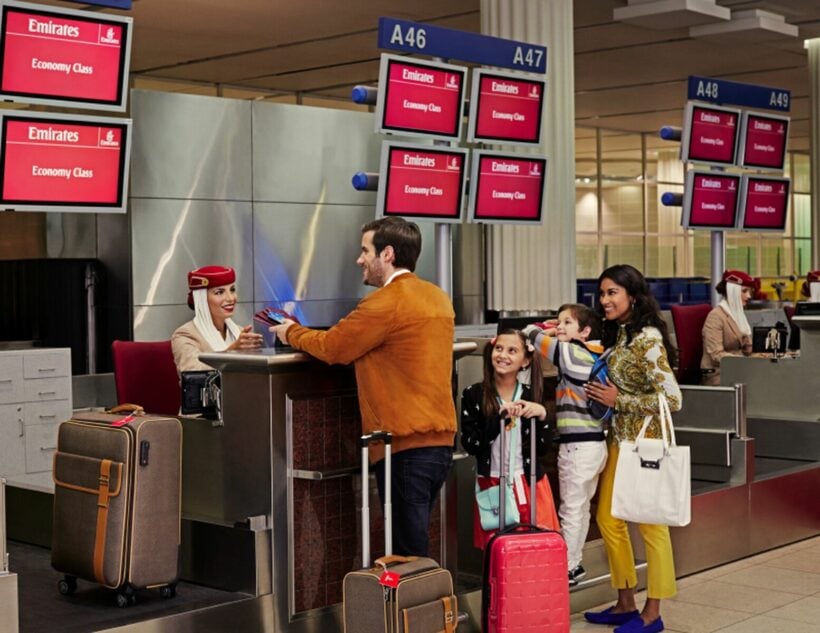Unvaccinated tourist turned away at check-in desk en route to Thailand

An unvaccinated tourist en route to Thailand was turned away at the check-in desk at Manchester Airport in England on Saturday after an airline didn’t get the memo about Thailand’s updated entry restrictions. If you are unvaccinated and plan to travel to Thailand, The Thaiger has advice about how to avoid this happening to you.
Thailand Pass was scrapped on July 1, supposedly making post-pandemic travel to Thailand “easier than ever.” Well…
Thailand’s Centre for Covid-19 Administration – the CCSA – and the Tourism Authority of Thailand – the TAT – reports that unvaccinated tourists can either show proof of a negative pro-ATK or RT-PCR test gained within 72 hours before arrival OR simply take an ATK test upon arrival.
The CCSA said that randomised checks will be undertaken at Thailand’s airports to check whether travellers have either proof of vaccination or proof of a negative pre-arrival Covid-19 test. Anyone without the documents may still gain entry into Thailand but will be subject to an on-arrival ATK test, according to the CCSA.
One unvaccinated traveller arrived at Manchester Airport on Saturday, July 2, expecting to fly to Thailand via Dubai and test upon arrival at Bangkok’s Survarnabhumi Airport. However, at the check-in desk, Emirates staff asked for either proof of vaccination or proof of a negative Covid-19 test. The tourist told The Thaiger…
“I read on the news that unvaccinated tourists were no longer required to take a pre-arrival test. I thought I could fly to Thailand and take an ATK test upon arrival. But after queuing for 2 hours at Manchester Airport, the Emirates check-in staff told me “there is no way you’re getting on this flight.” They turned me away. They told me to rebook my flight, stay in a hotel, and take a test the next day if I wanted to travel to Thailand.”
The problem is, despite Thailand’s CCSA and TAT confirming the scrapping of pre-arrival testing regardless of vaccination status, the UK government’s travel advice on Thailand’s entry restrictions says differently…
“From 1 July, you are no longer required to apply for permission to enter Thailand.
“You still need to show proof of either a vaccine certificate or negative COVID-19 test results.
“Vaccine certificate or pro-ATK/RT-PCR results (within 72 hours) will be checked by airline staff at check-in and once again when you arrive in Thailand.
“US$10,000 insurance requirements for COVID-19 treatment will no longer be mandatory, but is highly recommended.”
Since the scrapping of the Thailand Pass, several travellers have told The Thaiger that they have sailed through Suvarnabhumi Airport without being asked to show vaccination history, proof of a negative test, or without being asked to take an ATK.
However, until the UK government updates their travel advice to Thailand, unvaccinated tourists from the UK will likely be asked for proof of a negative test from their airline before they can travel.
For now, The Thaiger‘s advice for unvaccinated tourists is to gain a negative Pro-ATK or RT-PCR test result 72 hours before travelling, just in case.
The tourist said that not only did the Emirates staff cite the UK government’s travel advice, but also said it was a requirement of Dubai Airport for transiting passengers to have proof of a negative test. However, the Emirates website’s section entitled “Transiting in Dubai” states…
“Transiting passengers are not required to present a COVID 19‑PCR test certificate unless it is mandated by their final destination.”
Just in case whichever airline you are flying with hasn’t caught wind of Thailand’s updated entry restrictions yet, the safest thing to do is to gain a negative Pro-ATK or RT-PCR test result within 72 hours of arrival in Thailand, even though Thailand doesn’t require it anymore.
Latest Thailand News
Follow The Thaiger on Google News:


























